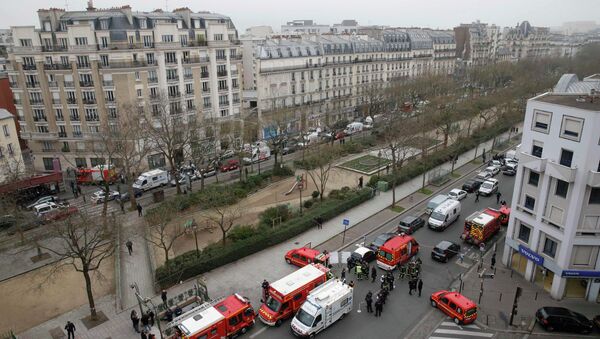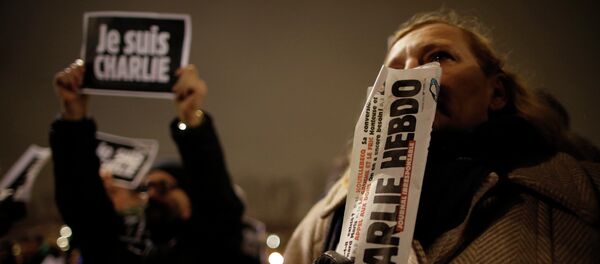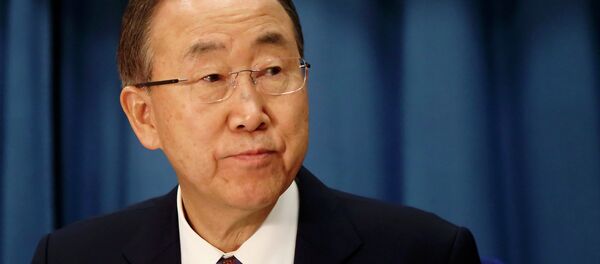MOSCOW, January 7 (Sputnik) - In a shooting incident in Paris on Wednesday, which has now been described by French President Francois Hollande as a terrorist attack, at least 12 people were killed, including the editor-in-chief of the French satirical newspaper Charlie Hebdo and three of his top cartoonists. With the attackers reported to have targeted the publication and its writers directly, shouting "we have avenged the Prophet" in the aftermath of the brutal attack, Sputnik tries to find answers to what could have motivated these radicalized Islamists to undertake such a heinous crime.
Charlie Hedbo, translated into English as Charlie Weekly, is a small French newspaper with a circulation of about 50,000 featuring satirical and biting commentary on the news, attacking just about everything and everyone from politicians and big business to religion, feminism, and everything in between, challenging the status quo wherever it may stand. The BBC's Hugh Schofield explained that the paper "is part of a venerable tradition in French journalism going back to the scandal sheets that denounced Marie-Antoinette in the run-up to the French Revolution," featuring "a provocative scurrility that often borders on the obscene." The paper has never shied away from lampooning Islam, which has led to several court cases, death threats and a firebombing of its offices in years past.
In 2013, editor-in-chief Stephane Charbonnier was featured in an Al-Qaeda publication on a list of nine men the movement wanted murdered "for crimes against Islam," and revealed that he had been placed under police protection, which also included round-the-clock surveillance of the newspaper's office in Paris.
In November 2011, the magazine's office was firebombed in an early morning attack, presumably over a special "Sharia Hebdo" edition of the paper featuring the Prophet Mohammed as special guest editor and with a cover cartoon image of the Prophet with a speech bubble saying "100 Lashes If You're Not Dying of Laughter."
In 2007, Muslims angered over the paper's republishing a Danish cartoon featuring the Prophet with a bomb-shaped turban took the paper to court over allegedly racist and insulting content. The court ultimately threw out the case.
Satirists Refuse to Yield to Pressure
With regard to the firebombing attacks on the newspaper's office in 2011, Charbonnier noted that they were carried out by "idiots" who "don't know what Islam is" and "who betray their own religion." When asked whether he was afraid about the threats against himself and his paper, Charbonnier noted that "if we worried about the consequences of each of our drawings in each of our 1,057 issues, then we would have had to close shop a long time ago," British news magazine The Week explained.
This Week's Issue Featured Story on Controversial French Author's New Novel
The newspaper's very last tweet, from 2:28 am this morning, featured a sarcastic cartoon about Islamic State militant group leader Abu Bakhr al-Baghdadi, featuring the leader and the captions "Best wishes to you too, Al-Baghdadi," with Baghdadi noting "and above all, good health."
Meilleurs vœux, au fait. pic.twitter.com/a2JOhqJZJM
— Charlie Hebdo (@Charlie_Hebdo_) 7 января 2015
Charlie Hebdo began its publication in 1970 after the scandalous closure of predecessor Hara-Kiri, which was closed after the paper had satirized the death of French President Charles De Gaulle. The paper's name is related to the fact that it originally reprinted the American cartoon Charlie Brown. Facing financial difficulties in the early 1980s, the satirical newspaper was closed for 10 years due to lack of financing before reopening in 1991.
Attacks May Be Part of Wider Islamic Radicals' Plans for Attacks on France and Europe
Over the Christmas holidays, French, Britain, Italy and Australian police heightened security following fears of "lone wolf" attacks over the holidays, after France witnessed a series of attacks resulting in over 20 injuries, and Australia a dramatic hostage-taking in mid-December.
In an interview for Sputnik last week, French journalist and Middle East intelligence expert Jean-Michel Vernochet warned that Islamists would begin attacking Europe systematically this year, saying that now, in addition to seeking "to transform Europe into the land of Islam," the radicals also "want to turn it into the land of war."
Vernochet said that the increased frequency and organization of the attacks means that "Europe cannot consider itself safe, especially considering the fact that France, together with the United Kingdom and Australia…is a member of the US-led coalition of 61 states assembled to fight [IS]."






